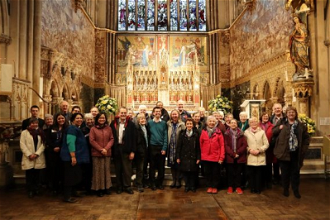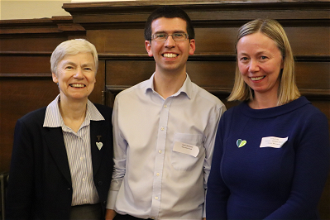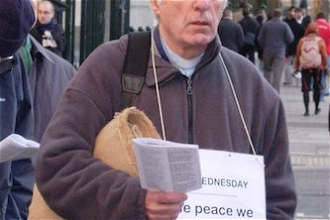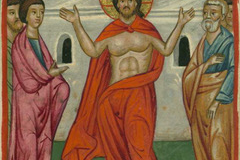Salesians discuss Romero Lecture & March for the Alternative
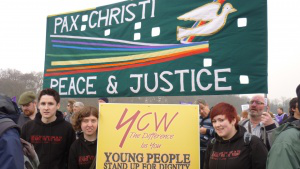
Two of the Christian groups at the march
Fr Martin Poulsom SDB and James Trewby were part of the Salesian group who attended last week's Oscar Romero Memorial service and lecture and then the March for the Alternative. Rather than write a traditional article they thought they’d do something slightly different…
Martin [M] says: Hello, I'm here! Now I know what you mean when you said it would probably take a few minutes to set up!
James [J] says: Not bad though - for a priest!
M says: I do magic tricks, too!
J says: But can you whistle?
M says: Good one - shall we start talking about what we're meant to be talking about, or shall we just have a daft conversation?
J says: Excellent. I think when we agreed to do this, one of our main motivations was to ensure the good news (the Gospel?) of the day gets out, not just negative stories
M says: Yes, I think it's really important that a sense of the Gospel be transmitted by what goes on in all that we do. After all, the reason I went to both events was out of solidarity - and by that, I mean solidarity as a Gospel value, as a value of Catholic Social Teaching. That's partly why I chose to walk to the Romero service and to walk back from the Rally in Hyde Park.
J says: You walked from home?
M says: I know that many of the people that we were in solidarity with, in El Salvador, in Guatemala, don't have access to other forms of transport. That's why, in part, I decided to walk throughout the day yesterday. That way, the whole day became a March for the Alternative.
J says: Wonderful!
M says: Of course, I also knew that the bus from Clapham Junction to Charing Cross wouldn't be running much beyond Tate Britain, so there was a good dose of (Salesian?) pragmatism there, too. But it was a LiveSimply commitment, too, an act of solidarity with all those who march for justice, peace and another way of living who don't have the option of hopping on a bus of they want to.
J says: I loved the time before the lecture, milling around with Christians (nice that it wasn’t just Catholics – our old friends from the Student Christian Movement were there, for example) who care about putting their faith into practice.
We were welcomed into St Martin in the Fields as “a church of prayer and protest”. What do you think of seeing those words together?
M says: Yes, it was good to be there with other Christians. I agree - that makes the solidarity we were trying to enact a more obviously Gospel value, I think. It embeds Catholic Social Teaching in a deeper (dare I say?!) and wider tradition, demonstrating its roots and inspiration more clearly in Gospel values.
J says: And singing with them! That was so powerful! Letting loose about justice and peace to the tune of Danny Boy!
We shall go out (words, June Boyce-Tillman; tune, Londonderry Air)
1. We shall go out with hope of resurrection,
we shall go out, from strength to strength go on;
we shall go out and tell our stories boldly,
tales of a love that will not let us go.
We’ll sing our songs of wrongs that can be righted,
we’ll dream our dreams of hurts that can be healed;
we’ll weave a cloth of all the world united,
empowered by Christ, whose Spirit sets us free.
2. We’ll give a voice to those who have not spoken,
we’ll find the words for those whose lips are sealed,
we’ll make the tunes for those who sing no longer,
call vibrant love to life in every heart.
We’ll share our joy with those around us weeping,
sing songs of strength to hearts that break in grief,
we’ll leap and dance the resurrection story,
including all within the circle of our love.
M says: Your comment on the church is interesting, too. I personally think that the church has to be a church of prayer and protest. It's a bit like that reflection on action and reflection, in a way. Prayer without protest can all too easily become a form of accommodation to injustice. That's one of the things that the witness of Oscar Romero makes clear to me, I think.
And, on the other hand, protest without prayer all too easily becomes protest for its own sake. That's the criticism I would make of the so-called 'direct action' that we saw in Oxford Street and Piccadilly yesterday - Christians are called to protest on behalf of the kingdom. And it's God's kingdom that the protest is on behalf of.
J says: Yes indeed. Freire said that we must not fall into the trap of only denouncing we must also announce a better way - and that means Kingdom values
M says: One of the things that stays with me from the rally, too, was when one of the Union leaders who spoke said that what we were doing was standing up for values that we hold dear, for a truth that we believe in. He said that, if it had been a Labour Government that was bringing in these cuts, we would still be here, we would still be marching, we should still be saying No.
From a Gospel standpoint, that's really important. It's not a party-political act - it's an act of political involvement that goes beyond party-politics. That's why Romero opposed the Marxists who put themselves forward as champions of the people. Not because of the
liberation they sought to achieve, but because of the ideology that lay behind it, and, as a result, the actions they did.
J says: What does this mean to us as Salesians?
M says: Don Bosco refused to get involved in party politics, and it says in our constitutions that SDBs don't get involved in party politics. But that doesn't mean that we can't act politically. That would be a church of prayer without protest.
J says: Coming to the radicals, I do think there is a place for the radical within these demonstrations. A bit from my research:
“The more radical forms are by far the most publicised, perhaps because they are deemed ‘newsworthy’ and necessitate dramatic language. One argument in their favour is ‘radical flank effect’. This suggests that they alter the definitions of middle and extreme, in this case in a manner beneficial to the movement; “Given a choice between negotiating with reformist NGO advocates or radical activists in the streets, officials will always prefer to work with the former” (Tarrow, 2005, p. 56). However, there may be risk in these dramatic forms garnering most attention and of treating engagement as an action rather than something ongoing; there is clearly great value in a long term commitment to a particular issue or cause (McDonald, 2006, p. 84).”
M says: Well, there is a difference, I think, between a pragmatic assessment of the tactics of protest and negotiation and the question of value.
J says: ok...
M says: Yes, it is true, I agree with you, that fire-extinguisher throwing, or ammonia-bombing police officers, does help the protest of the tens or hundreds of thousands move toward the middle ground.
J says: Yes, there is clearly a huge difference between different forms of "direct action".
M says: But, there is an important difference, I think, between a pragmatic assessment of what, in fact, happens and a value statement, especially where you're proposing Gospel values.
J says: And I think one of the dangers coming from the media of the over-simplification of treating all forms as the same – see here, for example. Some I think fit very well with Gospel values like Romero, Dorothy Day and... Jesus!
M says: Yes, absolutely - and how to respond when the media over-simplifies and marginalises the majority of protesters is something that has faced the student protesters in a particularly poignant way over recent months.
J says: Matt reminded me the other day about Walter Wink’s stuff about Jesus’ non-violent direct actions - see for example here. Jesus as subversive!
M says: I agree with you that there is all the difference in the world (and certainly all the difference in the Gospel) between non-violent direct action and the kind of 'direct action' that we see all too often on the fringes of legitimate protest. The politics of the kingdom is
dangerous and subversive, but the reason it is these is that it exposes vested interests to the light of the Gospel.
J says: indeed
M says: And that's always a threat to those who put power before people.
J says: But we must be careful not to get drawn into too much discussion of the “illegal bits” of the day. I didn’t see anything illegal at all – it was a very pleasant (if challenging) pray and then a lovely walk with so many friends, including our partners in the LiveSimply networks, the National Justice and Peace Network, Pax Christi, returned BOVA volunteers, JVC, CAFOD, YCW and others.
M says: That's Christian witness, I think - to stand up and be seen defending the poor and vulnerable, to walk in solidarity with them and to do that even when it's difficult, when there are challenges from those who accuse you of being utopian and unrealistic.
J says: Agreed. So can I take you back to the earlier question?
M says: Which one?
J says: One thing I was struck by in the lecture was the number of references to being prophetic. Don Juan said “Every baptised person has received a share of the prophetic ministry of Jesus”. He challenged us to have prophetic courage. What do you think that means to us a Salesians?
M says: Oh, sorry, I thought I'd said at least one thing about that when I reflected on party politics.
J says: You did! I just want more! For me this is about the intersection of 'educator' and 'prophetic'
M says: Tell me more about that – what do you mean?
J says: So many times in my life I've wrestled with "Should I be breaking the law to challenge injustice?". And what I come back to, is what I see as my vocation as a Salesian educator. To be true to my calling means attempting to do good justice education, helping people discover injustices, see the links to their own lives and then act upon them.
M says: Well, what about the final reflection that Don Juan shared with us from Romero - one of the most moving bits of the film of his life, for me. On the eve of his martyrdom, Romero said to the soldiers of the country that nobody is bound by obedience enact an unjust order. Conscience is a higher authority in those situations - there is an important role to play in challenging injustice by disobedience, like the suffragettes did. (Their witness was celebrated quite a bit at the rally in Hyde Park.) But, as we've been saying, the way that you challenge these unjust structures has to be non-violent, has to be in accordance with the values of the kingdom.
J says: So what do you think of the call to be prophetic educators?
M says: Well, I think I would link it with the ‘values of the kingdom’ thread. It seems to me that learning about the values of the kingdom has to be linked with prophetic action on behalf of them. One way to speak of that is to link education and evangelisation, in a Salesian way. Another is to speak of a church of prayer and protest, like they did at St Martin in the Fields.
Want to join the conversation? Email James at bova@salesianyouthministry.com



